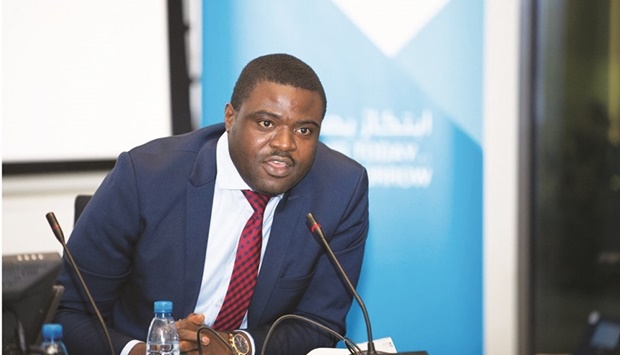Hamad Bin Khalifa University (HBKU), through its College of Law, has been selected by the UN Educational, Scientific, and Cultural Organisation (Unesco) to establish a Chair on Environmental Law and Sustainability.
Dr Damilola S Olawuyi, associate professor and associate dean of research at HBKU College of Law, has been appointed the first Chair holder.
The Unesco Chair on Environmental Law and Sustainability at HBKU was created through the UNITWIN/Unesco Chairs Programme with the goal of promoting an integrated system of research, training, information, and data analysis on environmental law and sustainable development.
The agreement signed between HBKU, a Qatar Foundation member, and Unesco, the United Nations' specialised agency for education, establishes the Chair for an initial period of four years.
Dr Ahmad M Hasnah, president of HBKU, said: “Dr Olawuyi’s research, teaching and leadership in the environmental law and energy law fields has helped place HBKU on the map as a leader in the area of sustainability. Working with Unesco will enable HBKU to expand its reach and thus contribute more to the global legal landscape relating to critical issues such as climate change and water and food security.”
As Chair holder, Dr Olawuyi’s multifaceted role will be to develop a programme to foster Unesco’s emerging work on sustainability science, including research, with an emphasis on the legal dimension of sustainable development. A Harvard and Oxford-trained scholar, Dr Olawuyi is a senior advocate of Nigeria and author of the new book, Environmental Law in Arab States, with recognised expertise in petroleum law, energy, and international environmental law.
The Chair will pursue collaboration within the Network of 880 Unesco Chairs, between internationally recognised researchers and teaching staff at HBKU, and other institutions in Qatar, the Arab region, and across the world.
Salah Khaled, director of the Unesco Office in Doha and representative to the Arab Gulf States and Yemen, stated: “As the Mena region is moving towards diversified and greener economies as well as sustainable urban development and lifestyles, it’s evident that countries will need expertise to support the development of adequate environmental policies and regulations based on evidence, benchmarks and best practices from other regions.”
Dr Olawuyi added: “I’m very honoured to play a role in the international collaborative Unesco Chairs’ network. My goal as Chair holder will be to both strengthen and build new, inclusive collaborations for higher education institutions to align their efforts towards the 2030 Sustainable Development Agenda. This is a challenging time for our societies and calls for innovative approaches and unified advocacy to build a better future for the years to come.”
The Unesco Chair on Environmental Law and Sustainability at HBKU was created through the UNITWIN/Unesco Chairs Programme with the goal of promoting an integrated system of research, training, information, and data analysis on environmental law and sustainable development.
The agreement signed between HBKU, a Qatar Foundation member, and Unesco, the United Nations' specialised agency for education, establishes the Chair for an initial period of four years.
Dr Ahmad M Hasnah, president of HBKU, said: “Dr Olawuyi’s research, teaching and leadership in the environmental law and energy law fields has helped place HBKU on the map as a leader in the area of sustainability. Working with Unesco will enable HBKU to expand its reach and thus contribute more to the global legal landscape relating to critical issues such as climate change and water and food security.”
As Chair holder, Dr Olawuyi’s multifaceted role will be to develop a programme to foster Unesco’s emerging work on sustainability science, including research, with an emphasis on the legal dimension of sustainable development. A Harvard and Oxford-trained scholar, Dr Olawuyi is a senior advocate of Nigeria and author of the new book, Environmental Law in Arab States, with recognised expertise in petroleum law, energy, and international environmental law.
The Chair will pursue collaboration within the Network of 880 Unesco Chairs, between internationally recognised researchers and teaching staff at HBKU, and other institutions in Qatar, the Arab region, and across the world.
Salah Khaled, director of the Unesco Office in Doha and representative to the Arab Gulf States and Yemen, stated: “As the Mena region is moving towards diversified and greener economies as well as sustainable urban development and lifestyles, it’s evident that countries will need expertise to support the development of adequate environmental policies and regulations based on evidence, benchmarks and best practices from other regions.”
Dr Olawuyi added: “I’m very honoured to play a role in the international collaborative Unesco Chairs’ network. My goal as Chair holder will be to both strengthen and build new, inclusive collaborations for higher education institutions to align their efforts towards the 2030 Sustainable Development Agenda. This is a challenging time for our societies and calls for innovative approaches and unified advocacy to build a better future for the years to come.”

